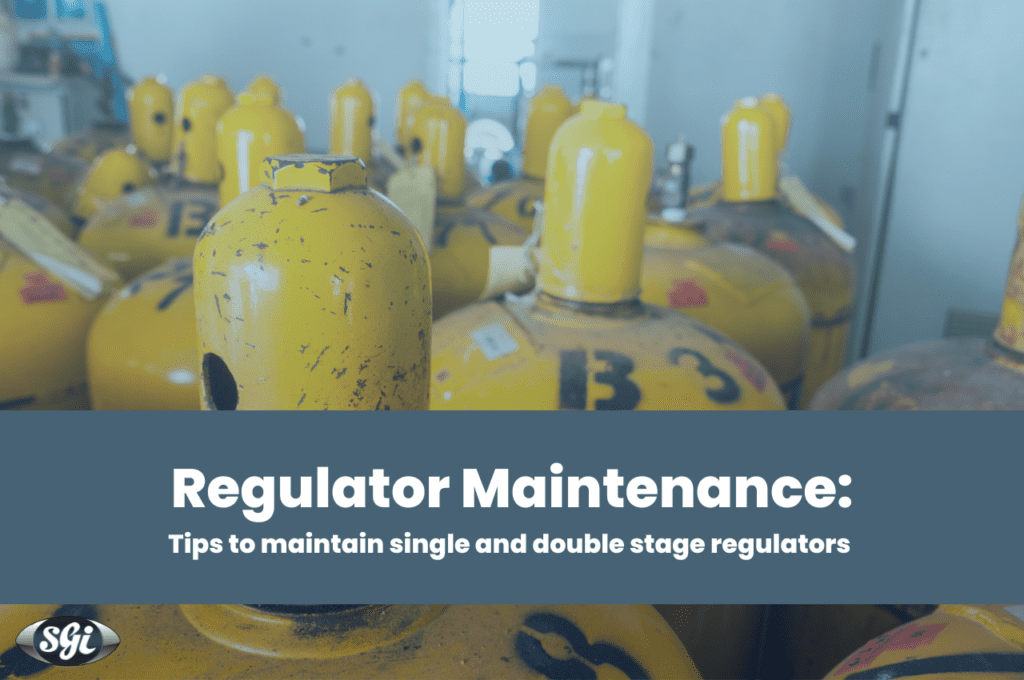
A specialty gas regulator is a complex piece of equipment with a multitude of parts and pieces that must work in tandem to maintain the perfect output pressure, especially the double stage regulators. Any deterioration, breakdown or spoilage can severely hinder the safety of the operator. Although, SGI's single and double stage regulators would last you a long time, if taken care of properly, whether it is storing and transporting the regulators safely, ensuring it is safeguarded against impact and drops, keeping impurities and foreign particles from entering the regulator or inspecting the device on a regular basis to make sure it is in working order.
Operators who deal with specialty gases day in and day out are aware of the risks that certain gas handling holds and are wary of using faulty equipment. They must make sure that their equipment is functional and dependable. This makes it necessary for them to follow maintenance downtime at regular frequencies and perform a set of tests that help determine the health of their single and double stage regulators.
Seat/gauge failure
One of the most common issues faced by operators in most double stage regulators is gauge failure, usually a result of seat failure. Easy to detect, the regulator gauge would either be pegged or sometimes have water in it. In colder temperatures, the repercussions are more serious as the water freezes, affecting the regulator in a manner leading to gas leak in the atmosphere. Gauge and seat failure can occur if the regulator has been dropped or compromised due to foreign particles in the regulator. Seat failure leads to equalization of downstream pressure with inlet pressure in a double stage regulator, ultimately leading to outlet gauge failure.
Diaphragm failure
Specialty gas regulators have sensitive diaphragms that are easily susceptible to damage. The operator must ensure that the pressure regulator is closed when attaching it to a new cylinder. If left in the open position when attaching to a new cylinder, the high pressure of the gas leaving the cylinder is bound to damage the diaphragm, leading to diaphragm failure. A diaphragm failure leads to a plugged bonnet vent— ensure that the bonnet vent is unplugged and open to rule out diaphragm damage.
Pressure tests
Once the operator has visually inspected the regulator, it is time to put the regulator through a pressure test. It's necessary that the regulator responds to the increase and decrease in pressure setting appropriately. 2 basic tests to check if the inlet and outlet pressure in your double stage or single stage regulator is regulated, are as follows:
The first test is where the operator inspects the working of the outlet gauge by controlling the pressure via the knob, button, or lever as per the regulator. Simply speaking, the operator must ensure that the gauge showcasing the outlet pressure responds correctly to the control set by the operator.
The second test is where the operator inspects the inlet valve. Here the operator must close the inlet valve or the source pressure valve a.k.a the cylinder valve and check if the inlet gauge drops the reading.
Once both these tests are conducted successfully, the operator can continue using the regulator as required. These simple tests help rule out most recurring and common issues that operators face when using pressure regulators. Some other advanced tests that can be performed by the operators once in a while would be a leak test and a creep test. The leak test allows the operator to identify leaks in the regulator by utilizing an industry approved leak test solution. The creep test, on the other hand, is done by trapping the gas in the regulator by closing the inlet and outlet valve. Once isolated, the pressure must then be observed by the operator, if the gauge reading keeps moving upwards after a few minutes, the regulator is faulty. If any of the above tests fail, it's time to repair or replace your regulator. As per Compressed Gas Association (CGA) guidelines, it is best to replace either the parts of a regulator that deteriorate over time or the regulator itself, as the case maybe. The regulatory body also mandates periodic maintenance for all equipment in the specialty gas industry. To know more about SGI's regulators, approved by most major regulatory bodies around the world, contact us now.